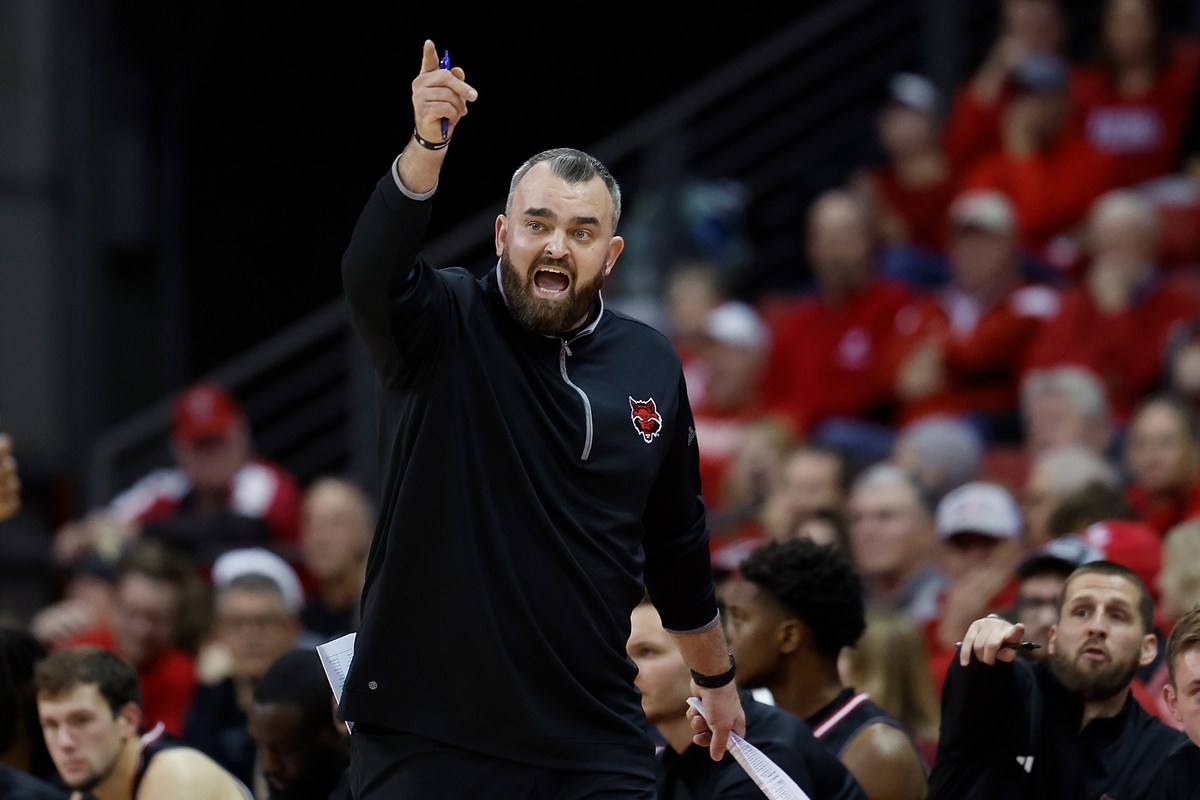North Carolina
North Carolina’s sports venues: A rich history of world class facilities :: WRALSportsFan.com

North Carolina is a state with a rich history in sports, and its sports venues reflect that.
From the historic Cameron Indoor Stadium to the Dean Smith Center to PNC Arena, North Carolina’s sports venues are some of the best in the country.
Football
Carter-Finley Stadium in Raleigh
Carter-Finely Stadium opened on Oct. 8, 1966, when the Wolfpack hosted South Carolina for Dedication Day. It initially opened as Carter Stadium to honor Harry C. & Wilbert J. “Nick” Carter, both graduates of the university. They were major contributors to the original building of the stadium.
The stadium added the name of Albert Finley, another major contributor to the university, in September 1979.
Carter-Finley Stadium, which has served as the home of the NC State Wolfpack football team since 1966, has a capacity of 56,919 fans. It is the second-largest stadium in North Carolina behind Bank of America Stadium in Charlotte.
Carter-Finley Stadium hosted the outdoor Stadium Series NHL game on Feb. 18, 2023, against the Carolina Hurricanes and Washington Capitals. The Canes won 4-1.
Kenan Memorial Stadium in Chapel Hill
Kenan Memorial Stadium opened on Nov. 12, 1927. It has served as the home of the University of North Carolina at Chapel Hill football team since then.
“It’s built in the woods,” said former WRAL Sports Director and current WRAL Sports contributor Bob Holliday. “I mean, it’s a remarkable location. I’ve never seen another stadium with this kind of location.”
As of 2018, Kenan Memorial Stadium has a capacity of 50,500 fans.
Brooks Field at Wallace Wade Stadium in Durham
Since 1929, Brooks Field at Wallace Wade Stadium has served as the home of the Duke Blue Devils. It initially opened as Duke Stadium.
In 1967, it was renamed for legendary Duke head coach Wallace Wade, who led the Blue Devils to a 110-36-7 record and two Rose Bowl appearances.
It includes the 1942 Rose Bowl. It was played on New Year’s Day 1942 at Wallace Wade Stadium. The Dec. 7, 1941, attack on Pearl Harbor prompted the Rose Bowl’s organizers not to play the game at the Rose Bowl in southern California. Oregon State beat Duke 20-16 in the game.
In July 2015, Duke alum Steve Brooks, the Phoenix American Insurance Group CEO, donated $13 million to the Duke Athletics department. The playing surface was renamed Brooks Field in his honor.
Since 2016, Wallace Wade Stadium has a capacity of 40,004 fans.

Bank of America Stadium in Charlotte
Since opening on Aug. 3, 1996, Bank of America Stadium – formerly known as Ericsson Stadium – has served as the home of the Carolina Panthers. It is also the home of Charlotte FC of Major League Soccer.
Bank of America Stadium is the largest in North Carolina, holding 74,867 fans.
In 1995, the Panthers played their inaugural season at Clemson University’s Memorial Stadium.

Basketball
Cameron Indoor Stadium in Durham
Cameron Indoor Stadium – formerly known as Duke Indoor Stadium – opened on Jan. 6, 1940. The legendary venue seats 9,314 fans.
The students and fans who attend Cameron Indoor Stadium are known as the “Cameron Crazies” for their support of the Duke Blue Devils.
For access to major games, including those against rival school the University of North Carolina, students reside in tents for months in an area outside of Cameron known as “Krzyzewskiville,” named after longtime head coach Mike Krzyzewski.
Cameron Indoor Stadium serves as the home court for Duke men’s and women’s basketball teams along with the school’s women’s volleyball team.
Dean Smith Center in Chapel Hill
The Dean Smith Center known by its colloquial name “The Dean Dome” opened on Jan. 18, 1986. The arena, named after longtime North Carolina head coach Dean Smith, has been expanded and renovated since it first opened.
It has a capacity of 21,750 fans.
Since 1986, it has served as the home of the North Carolina Tar Heels men’s basketball team. It has served as the home of the school’s women’s basketball team from 2008-2010.
The arena opened on Jan. 18, 1986, when North Carolina played Duke. The Tar Heels beat the Blue Devils, 95-92.
PNC Arena in Raleigh
PNC Arena opened Oct. 29, 1999. It had the name of the Raleigh Entertainment & Sports Arena from 1999–2002. It was called the RBC Center from 2002-2012.
It became PNC Arena in 2012.
PNC Arena is home to the Carolina Hurricanes of the National Hockey League and the NC State Wolfpack men’s basketball team.
It can hold 18,600 fans for hockey games, 19,500 for basketball games and 21,000 people for concerts.
With online sports gambling coming to North Carolina in 2024, there are several proposals for improvements at PNC Arena. The proposals include a sportsbook, bars in the upper level that face the playing surface, refreshing restrooms and suites, re-purposing the box office concourse, creating multiple access points and improving behind-the-scenes infrastructure for concerts and other events.

Reynolds Coliseum in Raleigh
Reynolds Coliseum continues to serve as the home to all services of ROTC and several NC State Wolfpack teams, including women’s basketball, women’s volleyball, women’s gymnastics and men’s wrestling.
It served as the home for the NC State men’s basketball team from 1949 to 1999. Each year, the Wolfpack men’s basketball team typically plays one regular-season game at Reynolds Coliseum.
Seating capacity has been reduced from 8,300 to 5,500 (can accommodate 6,000 depending on configuration) to provide an intimate home court environment for the Wolfpack.
While construction started in 1942 on Reynolds Coliseum, it didn’t open until Dec. 2, 1949, because of World War II, according to WRAL Sports contributor and former WRAL Sports director Bob Holliday.
“I’m a North Carolina graduate, but, without question, Reynolds Coliseum is my favorite building,” Holliday said. “You can hear the emotion in my voice as I’m talking about it.
“Just, so much stuff happened there.”
Greensboro Coliseum Complex
The Greensboro Coliseum Complex, often referred to as the Greensboro Coliseum, opened Oct. 29, 1959. It has been the home of several sports teams.
It currently serves as the home of the UNC Greensboro Spartans (NCAA), Greensboro Swarm (NBAGL) and Carolina Cobras (NAL).
The Carolina Hurricanes played at the Greensboro Coliseum from 1997 to 1999 before moving to Raleigh.
The Greensboro Coliseum often serves as the host site for the ACC men’s and women’s basketball tournaments.
Holliday believes the greatest men’s college basketball game was played at the venue.
“I’ll argue anybody til the final death that NC State-Maryland [in the] 1974 ACC Championship was … the greatest game ever played,” Holliday said. “Given what was at stake, two of the three best teams in America, and only one goes onto the NCAA Tournament or any tournament.”
NC State won 103-100 in overtime.
The Wolfpack won the national championship that season, defeating Marquette 76-64 at the venue.
NC State also defeated UCLA, 80-77 in double overtime, in the semifinal game played on March 23, 1974, at the Greensboro Coliseum. UCLA had won seven consecutive national titles.
The Greensboro Coliseum can hold more than 35,000 fans.
Spectrum Center in Charlotte
The Spectrum Center opened Oct. 21, 2005. It was known as Charlotte Bobcats Arena from 2005–2008 and Time Warner Cable Arena from 2008–2016.
The Charlotte Hornets have played at the Spectrum Center since 2005. It has an NBA capacity of 19,077.
The arena can expand to 20,200 fans for college basketball or pro wrestling events. Its concert capacity is 18,504.
It has a hockey capacity of 14,100 fans.
Baseball
Durham Bulls Athletic Park
The DBAP opened on April 6, 1995, for its inaugural season in front of 10,886 fans. The ballpark was built with a capacity to Carolina League standards. However, the land that the DBAP was built on had more room in case the ballpark needed to expand for Triple-A baseball.
“I have to tip my hat to my former boss and mentor, Jim Goodmon,” Holliday said. “He had the vision to make this happen.
“It’s arguably the most extraordinary that has happened in the Triangle in my lifetime.”
In 1998, triple-A baseball came to Durham. The Bulls moved up from High-A to Triple-A, with the DBAP expanded to Triple-A standards.
Before the DBAP’s opening, the Bulls played from 1926-1994 at Durham Athletic Park (DAP) at 428 Morris St.

NASCAR
North Wilkesboro Speedway
The North Wilkesboro Speedway initially opened on May 18, 1947. It had three reopenings: 2009, May 2010 and August 2022.
The site held the NASCAR All-Star Race in May 2023.
The speedway will host NASCAR’s 2024 All-Star Race too.
The speedway was renovated in 2021 using an $18 million allocation from the state’s share of funding from the American Rescue Plan Act.
North Carolina lawmakers added $4 million in the budget to continue improvements at the site. Additionally, the new budget also makes changes to the new sports betting law, passed earlier this year, that will allow sports betting lounges to be opened at tracks including the North Wilkesboro Speedway.

Charlotte Motor Speedway
The Charlotte Motor Speedway opened on June 19, 1960.
The complex features a 1.5-mile quad oval track that hosts NASCAR racing including the prestigious Coca-Cola 600 on Memorial Day weekend and the Bank of America Roval 400.
Depending on the speedway’s configuration, it can hold between 94,000-171,000 people.

North Carolina
North Carolina wildfires scorch 6,000 acres as lingering Helene damage hampers firefight: 'Absolute travesty'

Wildfires are raging through several North Carolina communities already struggling to recover from the devastation of Hurricane Helene.
POLK COUNTY, N.C. – The fight against destructive wildfires tearing through North Carolina is being significantly hampered by Hurricane Helene’s lingering devastation, officials revealed, calling the situation “an absolute travesty.”
EVACUATIONS EXPAND IN CAROLINAS AS WILDFIRES RAGE IN HURRICANE HELENE-RAVAGED AREAS

Footage posted by Greenville Water shows the scene at Table Rock Reservoir in South Carolina.
(Greenville Water)
The powerful storm, which swept through the region in late September, left behind a trail of destruction that is now proving to be a major obstacle in containing the blazes that have consumed over 6,000 acres in the state.
As evacuation orders remain in place for several neighborhoods, the stark reality of the intertwined disasters is becoming increasingly clear, North Carolina Forest Service Supervisor Nicholas Hoffmann said.

A “Home Sweet Home” sign is seen outside a home that was destroyed by a fire on March 23, 2025, in Columbus, North Carolina.
(Allison Joyce/Getty Images)
“It is an absolute travesty that it’s happened,” he emphasized. “And the Helene damage is actually one of the biggest contributing factors to the difficulty in fighting this fire because of all the damage, the landslides, the lack of access that it has created … in addition to the steep, steep terrain and the high winds we’re having right now.”
Fire officials are now grappling with a two-layered crisis.
FOX Weather meteorologists spent weeks on the ground in North Carolina following Helene, and their reports painted a stark picture of the sheer volume of fallen trees and debris that would dry out and become potent fuel, increasing the fire risk.
FOX Weather’s Robert Ray traveled to North Carolina where residents have described apocalyptic scenes of destruction.
“You have thousands of trees that are just lying in the forest that have been drying up over the last couple of months, and it’s a tinderbox,” FOX Weather Meteorologist Britta Merwin said. “These are hard areas to access. That’s what made it so challenging with Helene and the response efforts, and they’re still trying to rebuild. Now, they have a second natural disaster pretty much on their hands.”
The destructive power of wildfires in Polk County has become evident after 11 homes were destroyed on Tuesday.
Officials report that the Black Cove Fire, which was started by a downed power line, has burned over 3,000 acres and remains uncontained. The nearby Deep Woods Fire has also consumed nearly 3,000 acres with no containment. The smaller Fish Hook Fire is partially contained, but the situation led to the evacuation of 165 homes by Tuesday evening.

The Deep Woods Fire is seen on March 23, 2025, in Columbus, North Carolina.
(Allison Joyce/Getty Images)
By Tuesday evening, emergency management officials in Henderson County had mandated evacuations for the Summer Haven community and four other neighborhoods. An additional dozen nearby communities were also under pre-evacuation advisories.
NEW WILDFIRE NEARLY TRAPS DEPUTIES SEARCHING FOR HIKER MISSING WEEKS IN SOUTH CAROLINA WILDERNESS

Smoke from the Black Cove Fire in Polk County, North Carolina, was seen wafting skyward on Sunday. This video, shared to X by Grant Finch, captures the massive smoke cloud as seen from Peter Guice Bridge.
Simultaneously, South Carolina also issued evacuation orders Tuesday evening in Greenville and Pickens counties due to the Persimmon Ridge Fire, which is part of the larger Table Rock Fire Complex.
The South Carolina Forestry Commission said that good progress was made in battling the blaze on Tuesday, but later, “wind gusts dramatically increased fire activity.”
The Table Rock Fire has burned over 2,200 acres, and the Persimmon Ridge Fire has charred about 1,000 acres. Both are at 0% containment.
North Carolina
North Carolina Senate majority leader resigns, creating leadership vacancy

Republican Senate Majority Leader Paul Newton announced his resignation from the North Carolina Senate, effective Wednesday evening, creating a leadership vacancy as the Senate enters a busy legislative period
Newton, 64, is stepping down to pursue an opportunity outside of state government, according to a statement from Senate Republicans.
His specific plans have not been disclosed, according to the Associated Press.
“It has been an honor of a lifetime to serve the people of Cabarrus County for nearly a decade,” Newton said in his statement.
Senate leader Phil Berger praised Newton as a “valued voice and leader” who “provided a calm presence and wise counsel to many legislators during his time in Raleigh.”
ALSO READ: NC Senate passes bill requiring cellphone ban in schools
Newton’s departure means that Republicans in the 34th Senate District will select someone to fill his seat through the end of 2026. Additionally, Senate Republicans will need to convene to choose a new majority leader.
As majority leader, Newton played a significant role in enacting laws that extended conservative tax policies, removed the three-day grace period for mail-in absentee ballots, and set greenhouse gas reduction mandates on electric power plants operated by Duke Energy.
Newton, a former Duke Energy state president, joined the Senate in 2017 and was elected by his GOP colleagues to the majority leadership post after the 2022 elections.
The Senate’s bill-filing deadline was Tuesday, and the Senate aims to approve a two-year state government budget proposal next month.
Newton’s resignation marks a significant change in the North Carolina Senate’s leadership as the legislative body prepares for an intense work period.
The selection of his successor will be crucial in shaping the Senate’s future direction.
VIDEO: NC Senate passes bill requiring cellphone ban in schools
North Carolina
3 critically hurt after man shot at Amazon vans, caused head-on crash in North Carolina, sheriff says

KINSTON, N.C. (WBTV) – A Charlotte man and two others were in critical condition after he allegedly shot at multiple Amazon vans and crashed head-on into a car in eastern North Carolina this past weekend.
The Lenoir County Sheriff’s Office said the man, 34-year-old Lonneil Cordarius Mason, shot into three Amazon vans in Kinston, N.C. on Sunday, March 23. The first two vans were on C.F. Harvey Parkway near Kinston Regional Jetport, while the third happened on Highway 11.
Deputies said none of the Amazon drivers were hurt, but investigators found bullet holes left by .45-caliber and AR-15 pistols. One of the shots fired went through a van’s passenger door.
Just minutes after Mason allegedly shot into the vans, deputies said he drove up the wrong side of Highway 11. Deputies said he hit three vehicles. The first vehicle lost a mirror, the second was hit head-on by Mason, and the third vehicle was a truck towing lawnmowers.
The sheriff’s office said two females were in the car that Mason hit head on, and both of them and Mason were taken to the hospital. All three were said to have been in critical condition as of Sunday evening.
After the crash, deputies said .45 and AR-15 pistols were found, along with cocaine and fentanyl in Mason’s car and on him.
Mason is facing a list of charges related to Sunday’s chaos. Those offenses are listed below:
- Three counts of attempted first degree murder
- Three counts of shooting into occupied property
- Possession of a firearm by a felon
- Possession with intent to sell or deliver Schedule I controlled substance
The sheriff’s office said more charges could come later.
Deputies said Mason previously served more than 11 years in prison after he was convicted of second-degree murder and breaking and entering following a 2007 incident. Records showed he was convicted of those crimes in Mecklenburg County.
The Lenoir County sheriff called Sunday’s shootings and crash “tragic” and said his office did not yet know why Mason shot at the Amazon vehicles.
Anyone who witnessed or has information about the events was asked to call Lenoir County Communications at 252-559-6118.
Also Read: North Carolina woman arrested ‘immediately’ after getting out of prison
Watch continuous news coverage here:
Copyright 2025 WBTV. All rights reserved.
-

 News1 week ago
News1 week agoTrump Administration Ends Tracking of Kidnapped Ukrainian Children in Russia
-

 News1 week ago
News1 week agoVance to Lead G.O.P. Fund-Raising, an Apparent First for a Vice President
-

 Business1 week ago
Business1 week agoEgg Prices Have Dropped, Though You May Not Have Noticed
-

 Technology1 week ago
Technology1 week agoDude Perfect and Mark Rober may be the next YouTubers to get big streaming deals
-

 Technology1 week ago
Technology1 week agoThe head of a Biden program that could help rural broadband has left
-

 World1 week ago
World1 week agoCommission warns Alphabet and Apple they're breaking EU digital rules
-

 News1 week ago
News1 week agoTrump’s Ending of Hunter Biden’s Security Detail Raises Questions About Who Gets Protection
-

 News1 week ago
News1 week agoU.S. to Withdraw From Group Investigating Responsibility for Ukraine Invasion


























